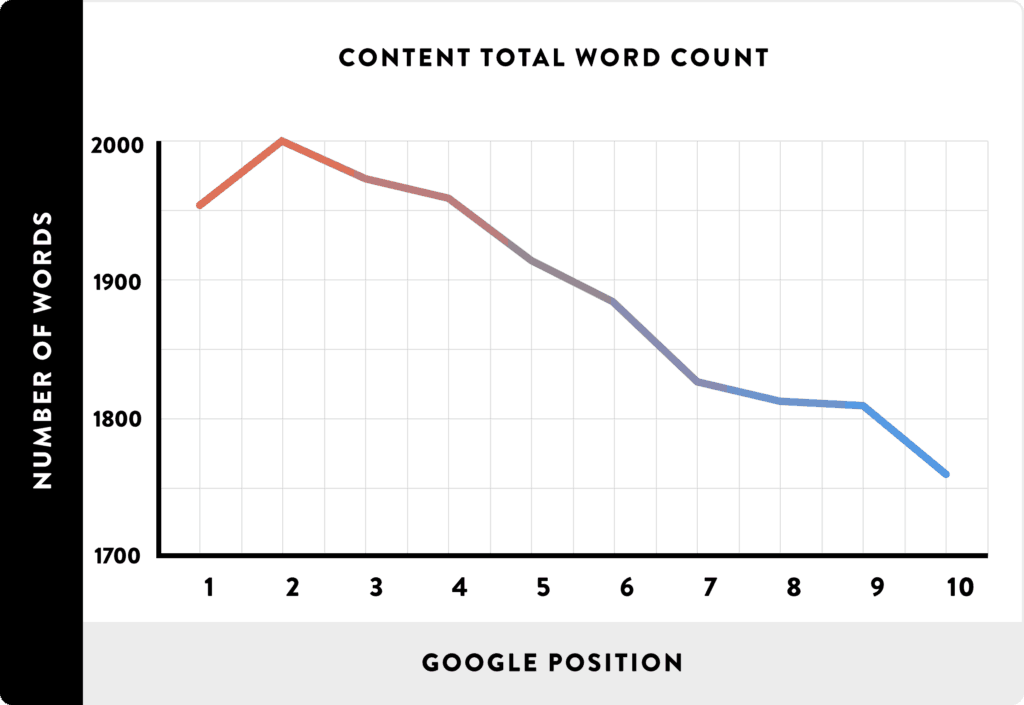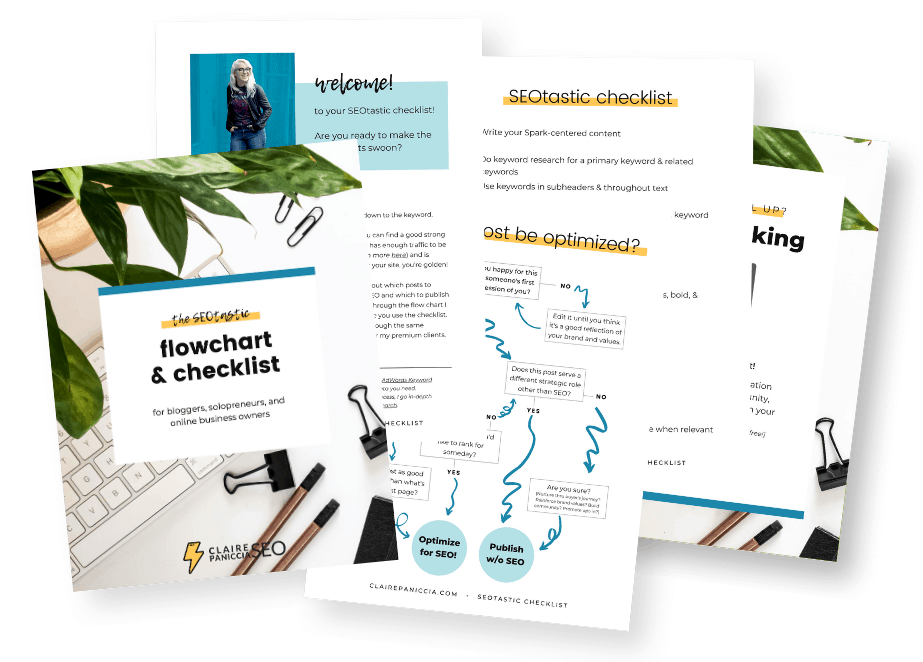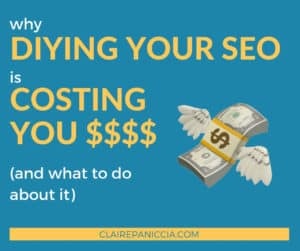
I know a lot of successful bloggers who built their business from the ground up, laying every damn brick themselves. Are you one of those? You started with nothing and built something pretty dang awesome and successful, all with free Google Spreadsheets, free tools like Yoast, and bootstrap-budgets.
It’s like making manna from CSS. Pretty badass!
You did all this with the dream of leading an impactful community and running a business with a lot of passive income.
But you feel like you should be further along that “passive income” road you keep hearing about.
I mean, you’ve been at this for years! C’mon, Universe! you’re thinking. Throw me a bone!
Well, my friend, it’s time for some tough love.
The Universe did throw you a bone. It’s called SEO.
Unfortunately, it’s a tough bone to catch because it makes you dig for it and even moves around when you’re least expecting it.
Okay, weird metaphor, but you get it.
The point is, by DIYing your SEO, you’re holding your success back.
You’re pretty okay at SEO; mostly you’ve gotten pretty decent results by being a good writer and crossing your fingers.
But you also know it’s one of those weird, semi-technical, vaguely mysterious marketing things that just isn’t your strong point.
In this post, I’m going to point out ways that you’re literally losing money by not having baller SEO. But don’t worry, boo. I’ve got your back with what you can do about it, too.
#1. Your affiliate income is totally stagnant (and only comes from a handful of posts)
If you’re like most bloggers, a huge portion of your revenue comes from affiliate income (maybe even most of it).
The idea, of course, is that you write an awesome post with monetization and relevant product links, people go to that page, click through the links, and buy the stuff you recommended.
But there’s one problem with this.
No one’s finding your posts.
Or at least, not most of them.
Odds are, only a handful of your monetized posts are bringing in enough traffic to significantly contribute to your affiliate revenue.
But for as long as you’ve been blogging, you know you’ve got way more monetized posts than just that handful, right?
What if all of those posts were bringing in the same level of traffic that your current successful handful are bringing in? How much extra revenue would that be??

#2. You pretty much rely on launches for your product sales
If you sell an ecourse or ebook, that’s awesome! Way to be a badass, creating your own product to bring mega value to your audience and scale up your business.
But…
A lot of your product sales completely rely on launches.
Now don’t get me wrong, launches are a totally valid way to sell stuff and a valuable tool to have in your arsenal. They have scarcity and urgency built in, which can be really helpful for instilling exclusivity and extra value in those high-ticket items.
But you can’t deny that launches are damn exhausting.
I mean, you can hardly call that passive, right?
What if you could be selling your digital product all the time? Consistently?
If your content was bringing in more traffic (without all the social media hustling) and pushed more people into an evergreen funnel, you could be making more money, consistently, and with less work. PLUS it’ll scale up over time! The more traffic you bring in, the more sales you make!
You can still do launches, but you won’t be totally reliant on them (which will make them less stressful), and you’ll be making more actually passive income in between. Hollah!
#3. Without social media, your email list wouldn’t be half its size (and so would your sales)
We’ve all heard it a million times: The money is in the list.
And you’ve worked your ass off since you started this empire of yours to build a list of dedicated, loyal followers and subscribers who actually read your emails and buy your stuff.
I know when I started blogging back in the day, my main (read: only) way of getting email subscribers was through social media promotion for your content and opt-ins.
Hustling in Facebook Group promo threads, #linkinbio on Instagram, “being helpful” in more Facebook Groups.
And let me tell you.
That sh*t takes tiiiiiime.
Which is totally fine when you’re starting out.
Lots of us wouldn’t be where we’re at today without hustling on social media.
But there comes a point where you’d rather be spending that time on more profitable tasks than hustling for a handful of subscribers at a time.
If your audience only grows as fast as you can post on social media (ie. when you’re not hustling, you’re not growing), that means you’ll be hustling for the rest of your days and “passive” will be a thing of dreams and fairy dust.
PLUS! Time is Money Too!
Social media takes time! Launches take time (and stress)!
And if time is money, then every hour you spend hustling on things that don’t have the maximum opportunity for payoff is money lost too.
(Okay, the launches may not be money lost, but think of the time in between when you could be making sales on auto in addition to the money you make on the launches. That’s the money lost with launches).
Not to mention the years taken off your life/gray hairs on your head from all this hustling.
So not only are you losing the money from all these things, but your losing the money on the time spent doing them, too.

So what can you do about it?
Or to put it another way, what are you not doing now that you could be doing for maximum SEO magic (so that you’re not one of the bloggers making the mistakes above)?
Don't worry, I gotchu, boo. Here's 4 things you can start doing today to combat this.
#1. Start doing keyword research to make sure you’re targeting ones that will bring in traffic
Keyword research is the cornerstone of strong SEO. If you don’t research to make sure your content is targeting phrases that get a decent number of searches per month, you’re basically shooting an arrow blindfolded.
An arrow, no less, that you spent all that time writing, editing, and making super valuable.
You do all that and only get action on it while you promote it to your list and on social media? Psssshh. You can do better than that.
#2. Actually optimize your post for the keywords you just researched
This one might catch you off guard.
I am optimizing my posts! you say. My content is all targeted and all about dat keyword.
Awesome! That’s a great start!
But there’s more to on-site optimization than just writing targeted content. There’s all the key places to include your targeted keywords, like subheaders and image alt text. There’s optimizing the page title and snippet for click through rate. There’s making sure your post can even compete in the results page on Google.
Getting green lights in Yoast isn’t how you rank in Google.
Make sure you’re doing all the things to make your blog post work hard in the SERPs. Otherwise you’re doing all that work creating the content and not getting all the bang for your effort.
#3. Write long-form informative content
Gone are the days when a successful blog post was 500-700 words long and skimmed over a topic in passing while talking about your day in Chiang Mai or briefly giving your opinion on something.
Also gone are the days when you could write a bazillion short blog posts each targeting a single long-tail keyword, each bringing in a trickle of traffic that all added up to a tsunami of traffic from Google.
That’s so 2008.
Now, the first page is full of content that is long, informative, in-depth, and evergreen.
These are your SEO money posts.
According to a study done by Backlinko, the average word count of a first page result on Google is 1,890 words.

Yep. You read that right.
Now, depending on the keyword and industry, you may be able to get away with 1,500 or even 1,000 ish words.
But really the idea is to write the best damn post about the topic ever, regardless of length.
(There’s just so much content on the internet these days that it keeps getting longer and more in-depth, so that’s the direction things are going right now).
#4. Drudge up the old posts and dust them off
Even if you’re doing all these things in your content now (major props!), if you’ve been at this blogger thing for any length of time longer than a year or two, you probably have plenty of content from back in the day that’s not quite up to 2018-SEO-snuff.
That means that you’ve already put in at least part of the work towards ranking for something awesome.
Drag it out of the back of the closet and give it a spruce up.
Make it more in-depth, find some good keywords and peek at the pages that are ranking well for them. And then take that old post and make it better!
Slap a new publish date on there, click Update, and watch the organic traffic to that page explode.
This is literally one of my all-time favorite ways to bring quick wins to my blogger clients (like in this SEO case study on my work with The Professional Hobo).
Plus, bonus! You don’t have to write something brand new that week!
Falling Behind On SEO Can Cost You Actual Money
SEO is one of those things that evolves so quickly, it can be hard to stay on top of it the longer you’re in the game.
But the cost of not doing so is too high.
These are just 3 ways that sub-par SEO is costing your blog actual money in the bank.
Then there’s also all the indirect growth it contributes to, like visibility, perceived expertise, and reaching a wider audience.
Stop holding your blog back. Commit to leveling up.
Free SEOtastic Flowchart & Checklist







These are super helpful – thank you for these! Bookmarking to help with my own SEO 🙂
You’re so welcome Riana! I’m glad they’re helpful 🙂
This is great!
Thank you so much! I’m glad it was helpful!